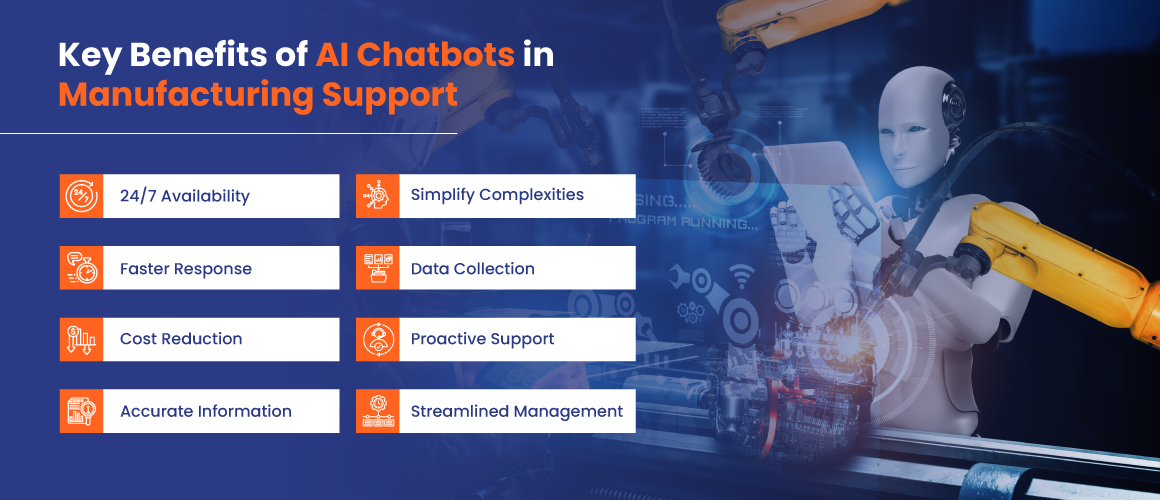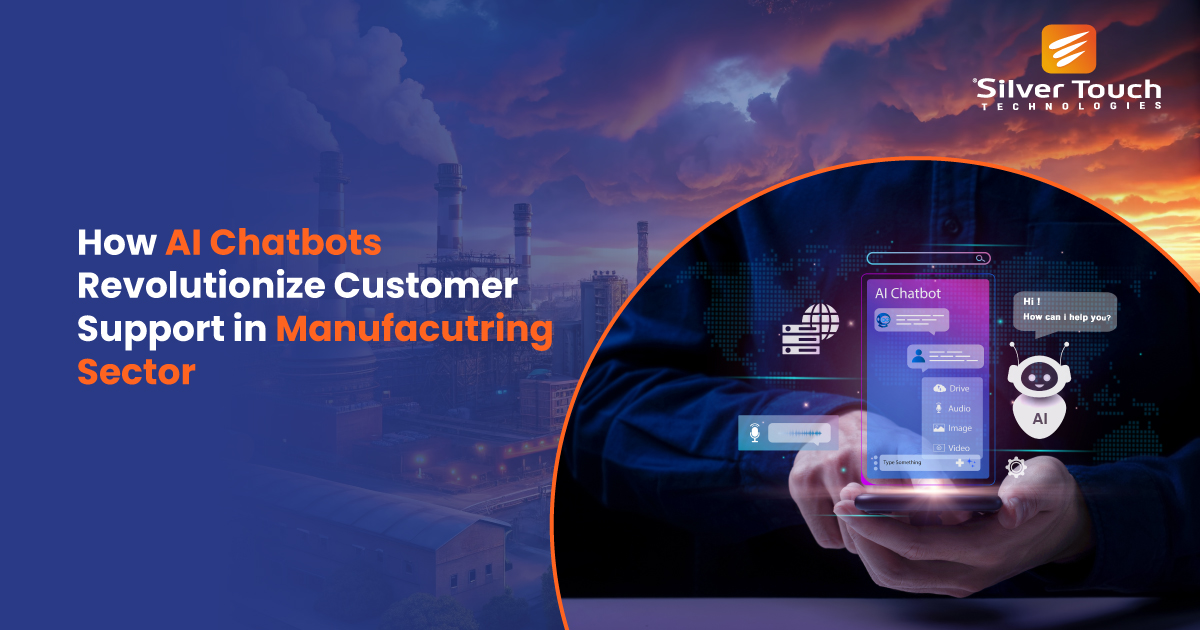Increasing competition and changing expectations of tech-savvy customers compel manufacturers to leverage the advancement of artificial intelligence. One of the most popular examples based on this revolutionary technology is AI-powered chatbots. As per the Statista prediction, the chatbot industry will reach around USD 1.25 billion by 2025. This estimate seems achievable as AI chatbots remain useful in performing various tasks, including customer service.
In this post, we will dig deep into the role of AI chatbots in enhancing customer support. We will focus on the scope and benefits of AI chatbots for manufacturing from the perspective of customer support. Let’s start with the unique challenges this sector faces in the domain of customer support.
Unique Challenges of Customer Support in Manufacturing
The manufacturing sector faces many challenges and hurdles due to various regulations and stringent compliance-related requirements. In such a scenario, this sector has several unique challenges for customer support, including
- Product Complexity and Technical Expertise
Manufacturing products like machinery and industrial equipment is highly complex and needs support agents with deep technical expertise. Customers also have technical questions that need specific answers.
- B2B Focus and High-Value Transactions
Customer support in the manufacturing business deals with other businesses. In this B2B model, downtime or product malfunctions can result in significant financial losses for the client. Therefore, responsiveness and resolution are essential.
- Supply Chain and Production Dependencies
Most manufacturing processes are interdependent and subject to supply chain complexities. Manufacturers need to follow production schedules and customer support has to address these dependencies with other issues.
- Global Operations and Diverse Requirements
Many manufacturing companies have diverse portfolios with global operations. It requires supporting customers in diverse languages, different time zones, and legal requirements. Multilingual support capabilities are essential due to these issues.
- Product Quality Issues and Returns
This is one of the most important challenges for the manufacturing industry. Manufacturers must deal with product defects or quality control issues, and customer support must handle these situations anytime with high empathy.
- 24/7 Availability
Chatbots offer round-the-clock support, ensuring customers receive immediate assistance irrespective of time zones, business hours, or even languages. This leads to increased satisfaction and reduced wait times.
- Faster Response
Automated responses to frequently asked questions and handling routine inquiries can make chatbots useful for reducing the workload on human agents. Moreover, these chatbots can improve response times.
- Cost Reduction
Implementing the best AI chatbot can lead to substantial cost savings by reducing the need for a large support staff. It can minimize the overheads and improve resource allocation.
- Accurate Information
AI-based chatbots can give consistent and accurate information based on the latest data. This can significantly reduce the risk of human error ensuring reliable support.
- Simplify Complexities
Sophisticated AI chatbots can address many technical questions, provide troubleshooting steps, and offer access to manuals. Manufacturing companies can simplify complexities with the help of chatbots.
- Data Collection
AI chatbot for manufacturing can gather valuable data on customer inquiries, pain points, and preferences. As a result, manufacturers can improve products, services, and overall customer experience.
- Proactive Support
Some advanced chatbots can analyze data to predict potential customer issues or equipment failures. IT results in proactive support and minimizing downtime for manufacturers.
- Streamlined Management
AI chatbots can provide customers with real-time updates on order status. They can track shipments, and answer queries related to order fulfillment, improving transparency and customer satisfaction.
- Defining Clear Objectives
First things first. Before implementation, it is essential to define the specific goals you want the chatbot to achieve. This will guide the development and deployment process.
- Understanding Customer Needs
A successful chatbot implementation is customer-centric. Manufacturers need to understand the customer’s common queries, pain points, and preferred communication styles.
- Choosing the Right Chatbot
These days, various AI chatbot platforms are available with different capabilities, complexities, and price. You need to select a platform that aligns with your technical infrastructure.
- Ensuring Data Privacy
Handling customer data, especially in a B2B manufacturing context, requires stringent adherence to data privacy regulations. Robust security measures and compliance with protocols are essential.
- Seamless System Integration
The AI-powered chatbot should integrate seamlessly with the existing CRM, ERP, and other manufacturing-related systes. It is essential for smooth data flow and quick responses.
- Knowledge Base Development
The chatbot’s intelligence heavily relies on the quality and comprehensiveness of its knowledge base. It is, therefore, essential to develop a well-structured and up-to-date knowledge base.
AI-based chatbots can help the manufacturing sector in addressing these challenges effectively while offering numerous benefits. Let’s go through the importance of AI chatbots in manufacturing.
Overview and Importance of AI Chatbots
AI chatbots can simulate human-like conversations with users through text or voice interfaces. Unlike traditional chatbots, AI-powered chatbots rely on pre-programmed scripts. Manufacturers can used these chatbots to provide their customers with more dynamic and persoanlized interactions on a 24×7 basis. As these chatbots leverage NLP and ML to understand user intent, manufacturing companies can get more effective performances across a wide range of tasks.
AI chatbots can enhance customer experience with more operational efficiency and autoation of routine inquiries. Manufacturers can get their assistance in improving lead generations and personalizing marketing efforts. In this digital era, when instant gratification or response can play a vital role, manufacturers can get the necessary support from AI-driven chatbots.
Key Benefits of AI Chatbots in Manufacturing Support
Customized AI chatbots for manufacturing can transform customer support services providing the sector with the following benefits

A reputed chatbot development company can assist manufacturers to leverage these benefits either through AI chatbots or hybrid approach.
Hybrid Approach- AI Chatbots with Human Agents
The manufacturing industry can combine the strengths of AI chatbots and human agents strategically to deliver optimal experiences. In this hybrid approach AI chatbots handle the initial interactions, addressing FAQs, providing basic troubleshooting, and gathering essential information. When a query becomes complex, requires empathy, or falls outside the chatbot’s capabilities, a human agent can handle the interaction.
This model leverages the intelligence of technology with the human agent’s expertise and nuanced understanding. It ultimately leads to more efficient, effective, and satisfying customer support in the demanding manufacturing environment.
AI Chatbot Implementation Considerations
AI chatbots for B2B and B2C sectors bring revolutionary changes. Whether it is manufacturing or any other industry, these chatbots offer many benefits. However, it is imperative to consider several factors to ensure the successful adoption of AI chatbots.
Here are these considerations
Apart from these considerations, manufacturers should focus on UX design, defining escalation paths to human agents, and training for internal teams. This can enable them to get a successful implementation of AI-powered chatbots.
Concluding Remarks
AI-enabled chatbots can give a 24×7 customer support with persoanlized experience and accurate response. It offers many business benefits to the manufacturing sector. However, manufacturers need to consider factors like platform characteristics and integration capabilities while implementing AI-powered chatbots. A reputed chatbot development partner can assist manufacturers to leverage the benefits while handing challenges effectively.
Silver Touch Technologies Canada is a leading company that specializes in building AI-powered chatbots. We build customized and intelligent AI chatbots for manufacturing, retail, fintech, and other core industry sectors. Contact us to learn the scope and benefits of tailored chatbots for your business and get the best AI chatbot for your company.
FAQs
It typically takes weeks to a few months to fully implement an AI chatbot in a manufacturing environment. However, it depends on the complexity and integration requirements.
AI chatbots can be secure for handling B2B data if they have robust security measures like encryption, access controls, and compliance protocols.
Sophisticated AI chatbots with natural language processing can handle many technical and complex manufacturing queries by accessing and processing relevant data.
AI chatbots differ from traditional chatbots by using AI, machine learning, and natural language processing to understand context and provide more dynamic, human-like responses. On the other hand, traditional chatbots rely on pre-programmed rules and keywords.



